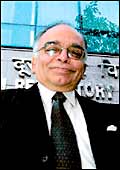|
Who: Munesh Khanna, Managing Director, NM Rothschild
(India). A name on the country's financial circuit, Khanna, a
chartered accountant, has worked on the financial restructuring
of Dabhol Power Company and an infusion of private equity into
Air Deccan
What: Will be joining Enam Financial Consultants as Managing
Director early next year. Khanna joined Rothschild in early 2002
and was earlier with Arthur Andersen as Country Head (Corporate
Finance)
Why: Khanna is said to be keen on expanding his role
to cover capital markets. This is not something that Rothschild
focusses on in India. Besides, Enam has just seen the exit of
Mahesh Chhabria who will join private equity major 3i
Impact: Khanna, 43, gets to expand his mandate (and leverage
some more of his Rolodex). Enam, which has managed 30 initial
public offerings over the past two years, can expect to strengthen
its presence in other areas
-Compiled by Krishna Gopalan
Beyond The Box
What: Toyota Innova, the successor to the best-selling
Qualis (which Toyota Kirloskar Motor Limited or TKML stopped producing
to accommodate the new entrant)
Why: After a strong beginning, sales of Innova are beginning
to slow down
Details: TKMC hoped to sell 42,000 Innovas in the first
12 months (the car was launched in January this year). It has
thus far sold 26,855
Rationale: One possible reason could be the fact that
the Innova hasn't really found takers among fleet operators who
couldn't have enough Qualises
Company response: No comment
-Compiled by Venkatesha Babu
We Told You So
A TRAI test drive shows the telcos were right
all along.
 |
| TRAI's
Baijal : The operators were
right all along |
The lack of spectrum and issues
arising from interconnection with state-owned telcos (read: BSNL
and MTNL) have been the preferred excuses of telcos responding
to gripes concerning poor services. There haven't been too many
takers for these; the prevailing opinion has been that telcos
can make do with existing spectrum provided they are willing to
spend a little more on infrastructure. Now, it emerges, these
weren't excuses after all.
So says the Telecom Regulatory Authority of India (TRAI) that
recently conducted what it calls a test drive of the services
of three telcos, Airtel, Hutch and BPL in Mumbai after receiving
a rash of complaints from subscribers over the quality of service
provided by these three companies. "I am only highlighting
the issues faced by the operators," says Pradeep Baijal,
Chairman, TRAI. The companies themselves have been singing that
tune for some time; only, there have been no takers.
-Kumarkaushalam
P-WATCH
A bird's eye view of what's hot and what's
not on the government's policy radar.
| RECIPE FOR RENEWAL |
»
Total corpus: Rs 1 lakh crore
» 60 cities
with million-plus populations to be covered
» To focus
on improving slums and providing better housing, sanitation
and water supply to urban poor
» Central
assistance to depend on implementation of policy and legal
reforms at the level of city governments
» Main
objective is to improve financial condition and creditworthiness
of local bodies |
REVIVING INDIA'S DECAYING CITIES
Indian cities can look forward to better days. The government
launched the Rs 1-lakh-crore Jawaharlal Nehru National Urban Renewal
Mission on December 3 to improve urban infrastructure in the country.
All state capitals, a few religious towns and some tourist hotspots
will be covered under the scheme. The programme, cleared by Prime
Minister Manmohan Singh, will focus on providing better housing,
water supply and sanitation, especially to the urban poor. So,
will Mumbai become another Shanghai? Unlikely! But the lot of
the common city dweller should, hopefully, improve.
A SECURITY NET FOR UNORGANISED SECTOR WORKERS
Here's another blockbuster scheme from the UPA government for
the benefit of the aam aadmi: a social security net for the 370
million unorganised sector workers in the country. The goodies
they can expect: health insurance, survivor benefit and old-age
pension. The state-owned Life Insurance Corporation of India has
already made a presentation in this regard to the Prime Minister's
Office. The government wants an accident cover of Rs 40,000, health
insurance of Rs 6,000 and a monthly pension of Rs 200 per person.
One of the funding proposals calls for the worker-beneficiary
to contribute Re 1 a day, and the Central and state governments
the rest. Er, how much is "the rest"? That is still being worked
out. The government is planning to table the Unorganised Sector
Workers' Social Security Bill, 2005, covering all these issues,
in the current session of Parliament.
TINKER, TAILOR AND OIL WILL BE WELL
Finance minister P. Chidambaram has hinted that the government
may tinker with the duty structure of oil products to tailor an
enabling atmosphere for economic growth. "Rising crude prices
are a cause for worry and I will not hesitate to take fiscal measures
if there is a need for them," he told the recently concluded
Economic Editors meet in New Delhi. Earlier this year, the government
had appointed a high-level committee chaired by C. Rangarajan,
Chairman of the Prime Minister's Economic Advisory Council, to
look into the issue of petroleum products pricing and subsidies
on LPG (liquified petroleum gas) and kerosene. The committee is
likely to submit its recommendations by the end of January. So,
expect some changes in the duties on petro-products in next year's
Budget.
-Ashish Gupta
 |
| PC's Ahluwalia:
Choice for all |
PROMOTING COMPETITION
The public sector container Corporation of India (CONCOR) will
soon face competition. Says Montek Singh Ahluwlia, Deputy Chairman,
Planning Commission (PC): "People should have a choice." Earlier,
the Railways had asked RITES to submit its recommendations for
framing the necessary guidelines in this regard. RITES, in its
report, had suggested an entry fee of Rs 135 crore for private
players who wish to challenge CONCOR's monopoly.
STEMMING THE ROT
The controversy over stem cell research may soon become a footnote
in India's medical history. The Department of Biotechnology is
putting in place an approval system for research projects in this
field. Every project will have to be approved by an ethics committee,
a Department of Biotechnology or Indian Council of Medical Research
panel and an yet-to-be-formed National Stem Cell Committee. This
should, hopefully, allow Indian companies steal a march over their
rivals in other parts of the world.
-Ashish Gupta
|







